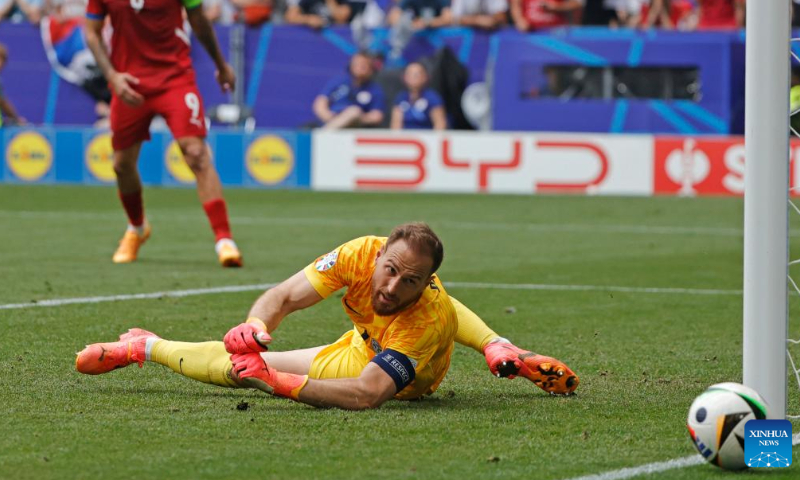Since mid-June, the UEFA Euro 2024 has been held in Germany, attracting viewers not only with exciting matches but also with the frequently displayed Chinese brand advertisements on the sidelines. Among the 13 official top sponsors of this year’s event, a record five are Chinese companies: Hisense, Alipay, Vivo, AliExpress and BYD. This reflects the overseas expansion and influence of Chinese enterprises. However, some German media have questioned this as part of “Beijing’s geopolitical strategy,” criticizing UEFA for “placing economic interests above its political and social objectives.” By this logic, does broadcasting the UEFA Euro in China mean helping Europe expand its political influence? Such political interpretations are utterly absurd.
Viewing Chinese companies sponsoring the UEFA Euro from an ideological perspective is not only arrogant but also reveals a lack of confidence. Modern football was born in Europe, which has a deep football culture and a broad audience. The UEFA Euro is a globally influential event. Statistics show that the number of Chinese fans following this year’s UEFA Euro exceeds that of the host country, Germany. Chinese enterprises partnering deeply with the UEFA Euro see it as both a valuable platform and an entry into the European market, hoping to increase advertising exposure and brand recognition. These Chinese companies are mature multinational corporations with advanced technology and high market recognition. Would these Western media be happier if these companies ignored the UEFA Euro?
UEFA, the organizer of the UEFA Euro, does not see the issue in the same light as some media outlets. It highlights that the UEFA Euro attracts “some of the world’s largest brands and organizations,” significantly increasing UEFA’s revenue for reinvestment in football and providing fans with unique opportunities and the best UEFA Euro experience. This is a factual attitude. Unlike traditional sponsorship, Chinese companies have deep cooperation with the UEFA Euro this time. For example, BYD is responsible for official vehicles of the UEFA Euro, and the Vivo X100 series is the official phone; Hisense provides technical support for VAR (Video Assistant Referee) reviews, and their new full-scene AI image quality platform and MEMC motion compensation technology offer viewers better and smoother match footage; Alipay has introduced the “scan-to-pay” trend, benefiting various merchants from small ice cream stands to chain restaurants. These collaborations are beneficial and create long-term positive cycles.
We have no intention of engaging in a duel or debate with Western media, but it is necessary to puncture the “information cocoon” they have carefully constructed. For instance, they claim that there are five Chinese companies as top official sponsors, compared to only three from Germany, the host country. If German readers who are not aware of the actual situation see this, they might feel a sense of crisis that their domestic companies are being squeezed out by Chinese companies. In reality, the UEFA Euro was open to global sponsors from early on, evolving from being dominated by American and European companies to later seeing high exposure from Japanese and South Korean companies. This reflects economic globalization. Moreover, advertising and sponsorship are part of corporate business strategies, and new foreign companies’ need to raise their profile in Europe is naturally higher than that of established European companies. Not to mention, Chinese companies have always excelled in localized operations. BYD has announced a factory in Hungary. Hisense has nearly 10,000 employees in Europe, five production bases, and six R&D centers. Like the UEFA Euro, Europe itself is a platform, and external investment is a recognition of Europe, not the other way around.
Sports exchange, as a borderless activity, should not be restricted by geopolitics and ideology. According to China Media Group, the official broadcaster of this UEFA Euro, several matches in the first two days of broadcasting exceeded a 1 percent viewership rate, and several matches had a viewership share of over 15 percent. The UEFA Euro is especially loved by young and elite audiences in China. Another broadcaster, China Mobile Migu, collaborated with several Chinese cities to host offline live broadcast events. There has never been a voice in Chinese society claiming that the UEFA Euro’s popularity in China is part of a “geopolitical strategy chess game” by Europe.
At the UEFA Euro, teams that give their all receive more cheers. In business, the same spirit of daring to fight and strive will also gain more supporters. Hopefully those who criticize Chinese companies, while cheering for European teams, will also cherish the precious spirit of struggle, effort, and fairness on the field, and view normal competition between companies with a positive mind-set, rather than accusing opponents of “cheating” at the slightest “loss.” Moreover, in this race, the result of the competition is not necessarily a zero-sum game; it is more likely to be mutually beneficial.
Global Times




